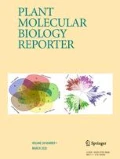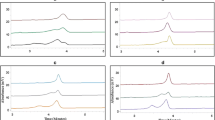Abstract
A high-throughput single nucleotide polymorphism (SNP) genotyping system was developed and used to select barley seedlings carrying superior alleles of β-amylase. In the malting process, β-amylase is a key enzyme involved in the degradation of starch. Four allelic forms of the enzyme are found in barley, each exhibiting a different rate of thermal inactivation, or thermostability. The level of thermostability influences starch degradation, which determines the yield of fermentable sugars for alcohol production during brewing. Control of the fermentability level is important for barley breeding programs to allow targeting quality profiles of new varieties to suit end-user requirements. Alignment of the cDNA sequences encoding the 4 enzyme forms revealed 6 SNPs (cSNPs). The 4 alleles could be identified unambiguously by codominantly genotyping 2 of the cSNPs using a duplex single nucleotide primer extension (SNuPE) assay. Two genotyping primers with their 3′ ends directly flanking the selected SNPs were annealed to the amplified target sequences and extended by single dideoxynucleotides complementary to the polymorphic nucleotides. Extended primers were analyzed using matrix-assisted laser desorption/ionization time-of-flight mass spectrometry (MALDI-ToF MS). Making use of the inherent molecular weight difference between DNA bases, incorporated nucleotides were identified by the increase in mass of the extended primers. A cleaved amplified polymorphic sequence (CAPS) assay enabling broader classification of the alleles was also developed to facilitate the transfer of this marker to other laboratories. Plants carrying alternative β-amylase alleles were selected at the seedling stage for barley breeding.
Similar content being viewed by others
Abbreviations
- cSNP:
-
coding single nucleotide polymorphism
- MALDI-ToF MS:
-
matrix-assisted laser desorption/ionization time-of-flight mass spectrometry
- SNP:
-
single nucleotide polymorphism
- SNuPE:
-
single nucleotide primer extension
References
Eglinton JK, Langridge P, and Evans DE (1998) Thermostability variation in alleles of barley beta-amylase. Journal of Cereal Science 28: 301–309.
Erkkilä MJ, Leah, Ahokas H, and Cameron-Mills V (1998) Allele-dependent barley grain β-amylase activity. Plant Physiol 117: 679–685.
Evans DE, Lance RCM, Eglinton JK, Logue SJ, and Barr AR (1995) The influence of beta-amylase isoform pattern on beta-amylase activity in barley and malt. In: Williams YA and Wrigley CW (eds), Proc 45th Australian Cereal Chemists Conference, Adelaide, SA, Australia. Royal Australian Chemical Institute, Melbourne, Vic, Australia, pp 357–364.
Evans DE, MacLeod LC, Eglinton JK, Gibson CE, Zhang X, Wallace W, Skerritt JH, and Lance RCM (1997) Measurement of Beta-amylase in malting barley (Hordeum vulgare L.). I. Development of a quantitative ELISA for beta-amylase. Journal of Cereal Science 26: 229–239.
Hardie DG (1975) Control of carbohydrase formation by gibberelic acid in barley endosperm. Phytochemistry 14: 1719–1722.
Kaneko T, Kihara M, and Ito K (2000) Genetic analysis of beta-amylase thermostability to develop a DNA marker for malt fermentability improvement in barley,Hordeum vulgare. Plant Breeding 119: 197–201.
Kihara M, Kaneko T and Ito K (1998) Genetic variation of beta-amylase thermostability among varieties of barley,Hordeum vulgare L., and relation to malting quality. Plant Breeding 117: 425–428.
Kihara M, Okada Y, Kuroda H, Saeki K, Yoshigi N, and Ito K (2000) Improvement of beta-amylase thermostability in transgenic barley seeds and transgene stability in progeny. Molecular Breeding 6: 511–517.
Logue SJ, Eglinton JK, Margach C, Roumeliotis S, Tansing P, Evans DE, and Barr AR (1999) Application of beta-amylase thermostability analysis in a barley improvement program. Proc 9th australian Barley Technical Symposium, Melbourne, Vic, Australia. Australian Barley Technical Symposium Incorporated, Warwick, Qld, Australia, pp 3.4.1–3.4.5.
Swanston JS and Molina-Cano JL (2001) Beta-amylase activity and thermostability in two mutants derived from the malting barley cv. triumph. Journal of Cereal Science 33: 155–161.
Thacker SP, Ramamurthy V, and Kothari RM (1992) Characterisation of barley β-amylase for application in maltose production. Starch 44: 339–341.
Author information
Authors and Affiliations
Corresponding author
Rights and permissions
About this article
Cite this article
Paris, M., Jones, M.G.K. & Eglinton, J.K. Genotyping single nucleotide polymorphisms for selection of barley β-amylase alleles. Plant Mol Biol Rep 20, 149–159 (2002). https://doi.org/10.1007/BF02799430
Published:
Issue Date:
DOI: https://doi.org/10.1007/BF02799430




